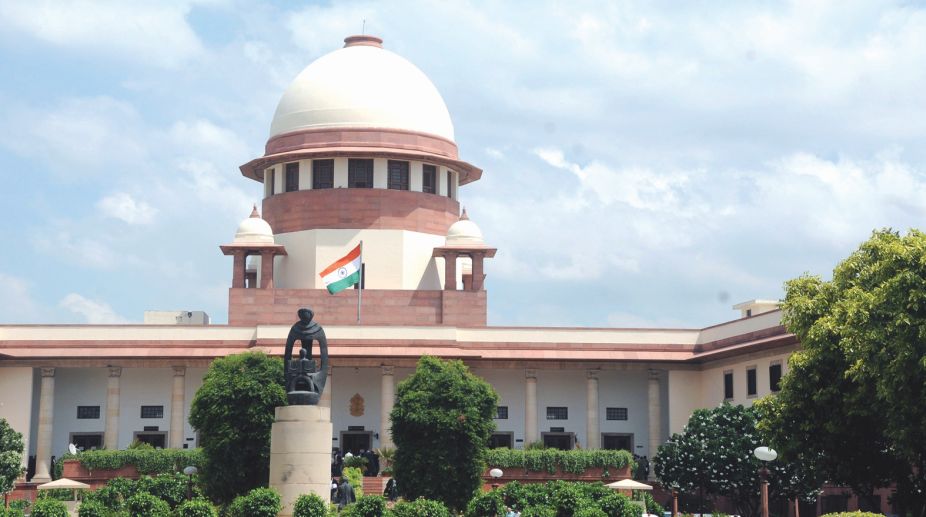Last month – January – was possibly the hardest for the Supreme Court and for those who found it hard to believe the unthinkable that has been happening in the temple of justice with its high priests engaged in what can well be termed as no less than a cold war. Something is terribly wrong in our judiciary and the concerns go far beyond some hair-raising headlines or the raised eyebrows of experts, legal luminaries, ex -judges, or people at large.
It seems the trouble in the temple of justice was so serious that some of its high priests had to decide to take the matter to the people, the real God in a democracy, failing to find any other solution. So, what is the matter? Is it just a momentary grievance; a ticklish issue getting more difficult by the day or was it just the emotions of some judges that came come out in the open with the force of a flood to wash away long-held beliefs on the cardinal principles of an independent judiciary?
Advertisement
Had some priests of fairness become so unfair as to bring the Supreme Court to the street? That was the question many asked when on 12 January, the four senior-most judges of the Supreme Court held a press conference to tell the nation that in order to save their souls and democracy they were forced to take this drastic step. In an extraordinary move, the judges said: “Our efforts have failed in convincing CJI to take steps to protect the institution.” Even more disturbingly, they said, “Democracy of this country is in danger.” This was a very serious charge.
In effect, this is what they said. It is well settled in the jurisprudence of this country that the Chief Justice is only the first amongst equals — nothing more or nothing less. In the matter of the determination of the roster there are well-settled and time-honoured conventions guiding the Chief Justice. Even as CJI is the master of roster to decide about the cases going to which bench and so on, the power of discretion cannot be discriminatory.
The statements of the four judges were shocking to all those who either watched the press conference or read or heard about it. And the nation saw mixed reactions to start with. Some, in the profession for long, even castigated the four judges who, they argued, brought infamy to the glorious institution by breaking the long-held norms of the highest court. But there were others who strongly backed the act of the judges.
The revelations of the four judges were shocking and raised many questions. What does a “bench of preference’’ mean? When a case is allotted to a preferred bench does it mean it is to ensure a preferred judgment? Is a judgment reached because of the law or because of the sweet will of the judge or judges or of the person who allots the case to the preferred bench? Who influences whom? Is judgment fixing the norm today? What will it lead to and how will it affect the nature and future of our judiciary?
“I am a junior Judge. Are you sure that you want me to hear your case?” Imagine a Supreme Court judge asking this of a senior lawyer. Justice Arun Mishra asked this, and the senior counsel said “absolutely”.
“Why are you using such polished court language. You are being so polite”, asked Justice Mishra in another case to a senior lady counsel. She replied that the legal education system had caused her to imbibe such language. Justice Mishra quipped, “maybe we can learn from you.” The deep hurt of the judge did not go unnoticed.
In the Supreme Court, there is nothing like a junior judge. A judge of the court is already a man of great experience with excellence in delivering justice. He has spent many years in the judiciary; decades as an advocate and several years as a judge and Chief Justice of a High Court. He has delivered landmark judgments and has a record of legal knowledge and administrative skills.
Do judges have bigger egos? Are they in fact rigid? Do they hate to bend? Do they carry their individual traits a little too far in their professional conduct or their professional traits in their personal conduct? And above all, do they really think of themselves as being above all others because they have the power of contempt over anyone who dares question them? I don’t know. But what I guess, and many opine is that some judges do not conduct themselves as expected of them. And possibly they are victims of their own ego.
The need of the time is to think positively and act progressively. If the judges show their wisdom in settling the matter quickly, it will be good. If not, they will force new thinking about the administration of justice. Though there may be some aberrations, mostly our judges have been spotlessly clean and stigma-free and have thus won the trust of a billion people. If that trust breaks, things may become disastrous.
The judges need to introspect. The nation talking about case fixing, corruption and favouritism does not augur well for the dignity of the institution. Taking a mutinous step today and keeping silent tomorrow will not do. The mutiny has sent a message that even the four judges might not have desired.
CJI’s power to roster and assign cases is not unique to the Supreme Court. It’s there in high courts and even lower courts. Whenever preference is exercised, risks are inherent. It is important therefore to devise a transparent system so that individual judges don’t feel oppressed and the trust in judges remains intact.
Finally, the Chief Justice of India got into action and a fresh roster was brought in to calm the agitated judges. The roster that became operational from 5 February has raised many questions and led to some speculation. The roster aggregates all important cases to the CJI; all public interest litigation, social justice matters, contempt of court matters, matters related to appointment of constitutional functionaries, among others. Despite the senior-most judges going public, the Chief Justice went on to exclude them from important constitutional bench matters.
Time alone will tell if the new arrangement will cause the ice to melt. There is some doubt whether the dissenting judges agree with the new roster. Ours is a nation of coherence and harmonious disagreement. The CJI must always set an example; above all, he must do everything he can to restore the dignity of his court.
The writer is Chairman, Paras Foundation and can be reached at praveshjain@parasdyes.com
















